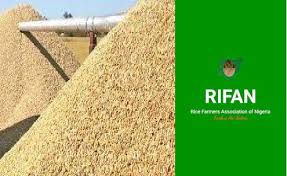In Hadejia, paddy rice business is booming
The Hadejia rice market is one of the popular markets where business of paddy rice is booming in Jigawa state. Although it is small in land size, however, the market takes delivery of over 2,000 tonnes of paddy rice on every market day. The supply of the commodity to the market largely comes from about […]

Nigeria to begin rice export in 8 months
The Hadejia rice market is one of the popular markets where business of paddy rice is booming in Jigawa state.
Although it is small in land size, however, the market takes delivery of over 2,000 tonnes of paddy rice on every market day.
The supply of the commodity to the market largely comes from about eight Local Government Areas namely Kirikasamma, Auyo, Birniwa, Guri, Kafin-Hausa, Malam-Madori, Kaugama and Hadejia itself.
However, Auyo, Kafin-Hausa and Kirikissama local governments are considered major suppliers of paddy rice to the market.
Communities of the eight local governments are taking the lead in the production of paddy rice because they fall within the areas that Hadejia-Jama’are river passes through.
The market has, in the last few years, assumed the position of supplying substantial quantity of paddy rice to some northern states.
Individual buyers from across the northern states formed part of the business class patronizing the market.
Chronicle observed that the recent upsurge in the production of rice across the rice producing belt in the country, leads to the significant increase in the number of buyers patronising Hadejia rice market.
This development, our reporter gathered, might not be unconnected with the federal government’s campaign for mass production of rice.
The mass supply of the commodity to the market did not only limit itself to attracting large number of individual buyers but also added value to the activities of other major players in the paddy rice business.
For instance, rice processing companies have taken over the market as they buy paddy rice in volumes for onward processing.
Depending on the company, some patronise the market through direct buying while others place orders through dealers.
The introduction of corporate buyers to the market has brought about some great changes including stabilised price and new pattern of business transaction.
Owners of the rice mills are not buying the rice from the market via the traditional price per bag, rather they buy per kilogram. The new norm, is gradually becoming the standard form of business transaction in the market as even the individual buyers have started adopting the system.
The new patten of business introduced to the market has become an issue of interest considering the fact that majority of the people involved in the business are the locals from within and surrounding villages.
Speaking to Chronicle, the Chairman of Hadejia rice market, Alhaji Jibril Dan-Umma, said the market takes delivery of over 2,000 tonnes of paddy rice from farmers weekly.
He said commercial activities usually reach peak between December and January, noting that around this period, Auyo and Kirikissam local governments, could supply as much as 100 tonnes of rice each to the market.
“On every market day , over N700m exchanges hands in the course of business transactions in the market. This can give you an insight of the stock that comes and goes out of the market.
“Apart from individual dealers that patronise the market from Katsina, Gombe, Gashua in Yobe state, Tudun Wada Dankade in Kano state and host of others, major rice processing companies also buy their raw materials in the market,” he said.
One of the dealers, who gives his name as Abdulkadir Aliyu told Chronicle that the price of the commodity in the market was being determined by the forces of demand and supply.
He explained that as major buyers started patronising the market, transaction pattern had assumed a new dimension as the commodity is being sold in kilogram as against hitherto, the value price per bag.
“The change in the transaction pattern came following the introduction of rice processing companies in the market, like Three Brothers, Silver, Olam and host of others.
“The presence of the companies did not only increase the quantity of the stock being supplies to the market but also introduce new model for business transaction of buying and selling in kilogram.
“Over 30 trailers and other categories of trucks each carrying between 25 to 30 tonnes load of paddy rice leave the market on weekly basis.
“One of the problems facing the market as a result of introducing corporate buyers, is pricing because those buying through direct supply are causing delay at the point of taking delivery and the more the delivery is delayed the more it loses weight.
“By its nature, the more rice dries the more it loses weight. In a day or so a rice bag of 75 kg may lose between 2kg to 3kg and this means a great loss to the supplier,” Aliyu said.
